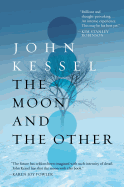
When the Society of Cousins' biggest male celebrity tries to gain custody of his son, he unwittingly fuels a rebellion led by his volatile lover. In Persepolis, an expat from the Society has married into a wealthy ice-mining family. When he's sent back on a dangerous mission, he must choose between conflicting loyalties.
If the literary zeitgeist has been dominated by dystopias, The Moon and the Other evokes Dickens and H.G. Wells. It's science fiction with heart, romance with idea density. It's utopian and it's savvy. Kessel's droll, sideways humor surfaces periodically, as in "uplifted" dogs and casual allusions to punitive "debtors freezers." He explores gender identity and politics, portraying the complexity of social customs and relationships with neither jaundice nor bullishness. Focused on the lives of his characters, Kessel keeps pace yet makes room for his meticulously thought-out future world.
It's a grownup vision: not because it's serious, but because it's wondrous. It extrapolates not just society and technology, but real-world emotions and human behavior as well. This moon is a place we've never seen before in fiction. --Zak Nelson, writer and bookseller

